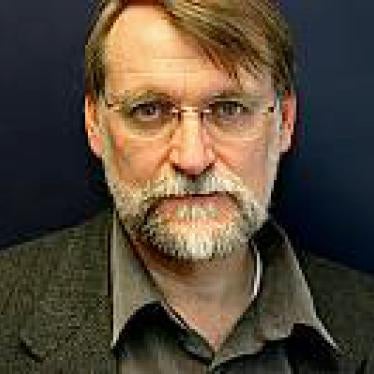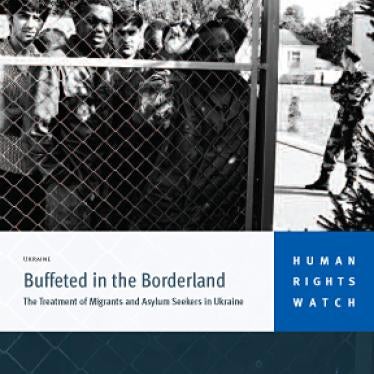The year's end will be the first anniversary of an agreement between the European Union and Ukraine to take back "third country nationals" who cross borders without permission. Readmission agreements are a cornerstone of the EU's strategy to stop the flow of migrants by shifting the responsibility for handling them to neighbouring countries. But is Ukraine up to being the EU's buffer zone?
The EU has invested millions of euros to build Ukraine's capacity to keep migrants and asylum seekers from entering the EU and to receive people sent back there under the agreement. Yet, when I led a Human Rights Watch delegation to Ukraine earlier this year, we found that returnees from EU states were subjected to brutal treatment and arbitrarily detained in EU-financed detention centers.
EU states are obliged under the EU's own rules to consider asylum claims before sending asylum seekers back to Ukraine. But many of the people we interviewed said they had been sent back from Slovakia or Hungary with their claims for asylum ignored. Asylum seekers denied a chance to lodge claims in the EU are sent back to an asylum system in Ukraine that has been utterly incapable of providing protection.
In fact, the bulk of the EU capacity-building money was devoted to border enforcement and detention facilities, not to improving Ukraine's ability to provide asylum or humane treatment.
Some migrants told us credible accounts of having been tortured while in the custody of Ukraine's State Border Guard Service. Allegations included accounts of being subjected to electric shock by Ukrainian plain clothes officials during interrogations about people-smuggling networks.
An Iraqi man spoke of his interrogation after being arrested by Ukrainian border guards in late April: "The treatment was savage. They beat us and kicked us and abused us verbally. They also electric-shocked me ... I admitted that I wanted to cross the border and that we were smuggled ... I felt my heart was going to stop ... I just admitted everything, but they didn't stop torturing me."
From August 2009 until August 2010, Ukraine was unable to process any asylum claims because the system was paralysed by a political standoff. Although asylum processing has resumed, the system remains dysfunctional. Many asylum seekers told us they had to bribe migration officials to file asylum applications and to get an interpreter for the asylum interview or required documentation.
Unaccompanied children, who are also subject to return from the EU, face particular obstacles in seeking asylum and obtaining documents. They cannot file a claim without a legal representative, but the authorities in some regions refuse to appoint legal representatives for them. Human Rights Watch was able to find only one case in which an unaccompanied child had been granted refugee status.
Conditions in migration detention facilities have improved in recent years, but migrants are detained arbitrarily in these facilities-built with large sums of EU money, sometimes without being taken before a judge or given access to a lawyer. Despite a six-month time limit on detention, migrants can be quickly re-arrested and sent back for another six months. We met a number of migrants who had been detained multiple times.
It is no secret that many in the EU would prefer to keep migrants and asylum seekers out, diverting them to transit countries on its periphery like Libya, Turkey, and Ukraine. Supporters of this approach may like to believe that migrants in these countries are well-treated. As Ukraine shows - and as we have previously found in Libya and Turkey- that is not the case.
Signing formal agreements and pouring money into the hands of its external partners does not absolve EU member states of their obligations under the EU Charter of Fundamental Rights to provide access to asylum or the ban under international law on returning people to places where they would likely face torture or ill-treatment.
These obligations demand that the EU suspend its readmission agreement until Ukraine shows it can give asylum seekers a fair hearing, treat migrants humanely, and truly protect refugees and vulnerable individuals.
But beyond the immediate imperative to stop these returns, the Ukraine example should also prompt EU member states to reconsider the whole enterprise of externalising migration controls: when EU member states put people into the hands of torturers, their own hands are no less dirty.
Bill Frelick is director of the Human Rights Watch Refugee Program and co-author of a new report, Buffeted in the Borderland: The Treatment of Asylum Seekers and Migrants in Ukraine








